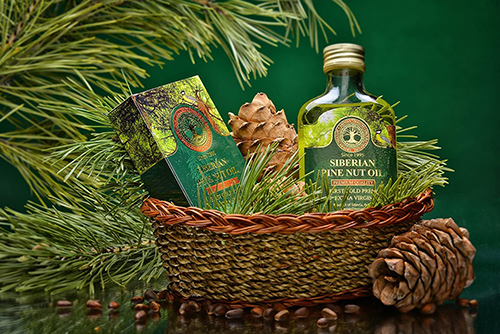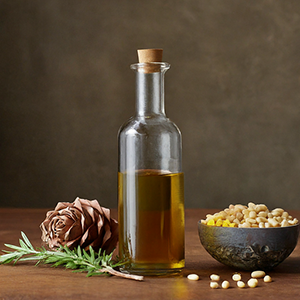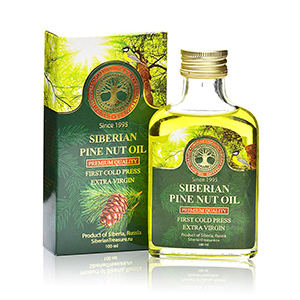Siberian pine nut oil benefits have been known since ancient times. This excellent pine nut oil is considered one of the most organic healing products. The oil is made from pine kernels grown from cedar trees in the remote region of the taiga forest in Siberia. Traditional production methods have been taking place for centuries and are well documented in the “Ringing Cedars of Russia,” a piece by Vladimir Megre. Siberian pine nut oil must be kept away from any metal during the production phase, which can negatively affect the quality of the oil. Therefore, any method of extraction must be made solely with wooden equipment.

Siberian Pine Nut Oil Benefits
Siberian pine nut oil is an effective appetite suppressant. We have all attempted to lose weight at certain times. Oils extend the time that food stays in the stomach, which helps to make you feel full for a more extended period. If you want to lose a few pounds, adding a spoonful of Siberian pine oil thirty minutes before each meal would be beneficial. Most people are amazed at the oil’s ability to suppress the appetite.
One of the benefits of Siberian pine nut oil is its ability to battle toxic free radicals. These free radicals are known to science as single-atom oxygen molecules with unpaired electrons. The name “free radicals” might not sound that bad, but they are responsible for cell degradation within our bodies. Free radicals are considered a factor in various diseases such as Alzheimer’s, Parkinson’s, and cancer. These rogue molecules are also responsible for aging. The air you breathe, the foods you consume, and the water you drink all contribute to the generation of free radicals.
Thankfully, the consumption of antioxidants helps stave off those free radicals. Siberian cedar nut oil is a valuable source of some of these powerful antioxidants in the form of vitamin E. According to proven scientific research, Siberian pine nut oil’s vitamin E concentration is superior to olive oil’s.
Siberian pine nut oil also has a prebiotic effect, which is highly beneficial for stomach conditions such as acid reflux and gastritis and helps digestion. Russians have used Siberian cedar nut oil for centuries as a stomach and intestinal remedy. Scientific research shows that Siberian pine nut oil has prebiotic properties.
Prebiotics help encourage the growth of healthy bacteria in the gut. People who experience ongoing digestive issues know how uncomfortable it is. Thankfully, taking a spoonful of Siberian pine nut oil on an empty stomach helps ease and promote digestion, relieving the symptoms of many digestive ailments.

The anti-inflammatory properties of Siberian pine nut oil are also well documented. Inflammation plays a substantial role in the development of a variety of diseases. The Journal of Functional Foods published a recent study on the benefits of cedar nut oil, its anti-inflammatory properties, and its abundance of pinolenic acid. Scientists concluded that this vital substance fought infections and protected against inflammation.
Another one of the many benefits of Siberian pine nut oil is its ability to strengthen the immune system. Siberian oil is rich in vitamins and minerals that support the immune system and overall health. These essential vitamins and minerals include carbohydrates, proteins, phosphatides, saturated and unsaturated fatty acids, lecithin, vitamins A, B1, B2, B3 (PP), E, and D, and amino acids.
Taking a spoonful of Siberian pine nut oil daily is a high-quality supplement that provides essential nutrients for optimal body performance.
DISCLAIMER: All content on this website is presented solely for educational and informational objectives. Do not rely on the information provided as a replacement for advice, diagnosis, or treatment from a qualified medical expert. If you are pregnant, nursing, or have any preexisting medical concerns, talk to your doctor before using any herbal or natural medicines.
References
- Mayo Clinic: https://www.mayoclinic.org/
- Cleveland Clinic: https://my.clevelandclinic.org/
- Lee, J. W., Lee, K. W., Lee, S. W., Kim, I. H., & Rhee, C. (2004). Selective increase in pinolenic acid (all-cis-5,9,12-18:3) in Korean pine nut oil by crystallization and its effects on LDL-receptor activity. Lipids, 39(4), 383–387.
- Pasman, W. J., Heimerikx, J., Rubingh, C. M., van den Berg, R., O’Shea, M., Gambelli, L., … & Hendriks, H. F. (2008). The effect of Korean pine nut oil on in vitro CCK release, on appetite sensations and on gut hormones in post-menopausal overweight women. Lipids in health and disease, 7(1), 10. https://doi.org/10.1186/1476-511X-7-10
- Vaughn, A. R., Clark, A. K., Sivamani, R. K., & Shi, V. Y. (2018). Natural Oils for Skin-Barrier Repair: Ancient Compounds Now Backed by Modern Science. American journal of clinical dermatology, 19(1), 103–117. https://doi.org/10.1007/s40257-017-0301-1

